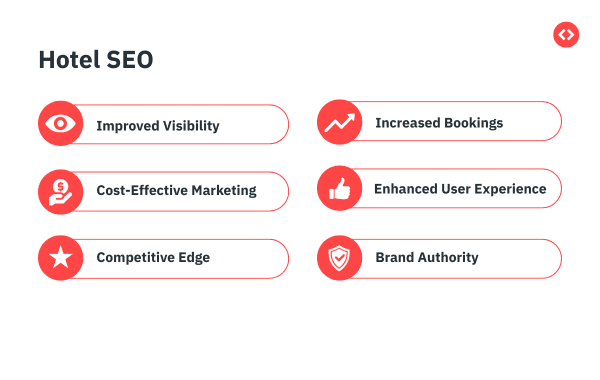Table of Contents
Updated : Aug 4, 2025
Welcome back to the second installment of our guide on Hotel SEO in 2025, designed specifically for hotel owners and managers eager to elevate their online presence. In our previous blog, we dove into the essentials of understanding Hotel SEO and its pivotal role in attracting guests, demystified the terminology specific to hotel SEO, and highlighted the critical importance of targeted keyword research. We also emphasized the age-old adage that “content is king,” exploring how high-quality, relevant content can drive more bookings and boost your search rankings. In this blog, we’ll explore advanced strategies to help your hotel stand out in the digital landscape, attracting more guests and achieving higher occupancy rates.
How Social Media Strategy Can Boost Your Hotel SEO Game

Social Media platforms like LinkedIn, Instagram, Facebook & Twitter have immense potential for hoteliers to engage with their audience and drive occupancy & revenues. Let’s explore how social media can boost your Hotel SEO game.
1. Enhancing Brand Visibility
A strong social media presence increases your hotel’s visibility, helping potential guests discover your brand more easily. By regularly posting engaging content on platforms like Instagram, Facebook, and Twitter, you not only captivate your audience but also improve your search engine rankings. Each like, share, and comment acts as a signal to search engines that your hotel is relevant and popular. This increased visibility can lead to higher website traffic, an important factor in hotel SEO.
Pro Tip: Utilize visually appealing images and videos of your property and guests to captivate your audience. Use relevant hashtags that can lead to an increase in discoverability.
2. Driving Quality Traffic to Your Website
Social media platforms are excellent tools for driving targeted traffic to your hotel’s website. By sharing blog content, special offers, and updates directly linked to your website. This way, you encourage followers to visit and engage with your content. This targeted approach not only enhances the quality of traffic but also positively impacts your hotel’s SEO by reducing bounce rates and increasing the time spent on your site.
Pro Tip: Schedule regular posts linking back to your blog or website using tools like Buffer or Hootsuite. This ensures consistent engagement without overwhelming your audience.
3. Building a Community Through Engagement
Engaging with guests and potential visitors on social media fosters a sense of community and loyalty around your brand. Responding promptly to comments, soliciting feedback, and encouraging user-generated content can foster a lively dialogue that reflects positively on your hotel. This engagement demonstrates to search engines that your hotel has an active and interested audience—an essential factor in enhancing hotel SEO.
Pro Tip:Set aside time daily to interact with followers and potential guests. Utilize tools like Mention to track brand mentions across various platforms for prompt responses.
4. Leveraging User-Generated Content
Encouraging guests to share their experiences through photos, reviews, or hashtags provides fresh content for both social media platforms and your website. User-generated content is authentic and trustworthy, significantly influencing potential guests’ decisions while enhancing your credibility online. Search engines value this type of content as it reflects real-life interactions with your brand, positively impacting your hotel’s SEO performance.
Pro Tip: Encourage guests to check in on platforms like Facebook or tag themselves in Instagram photos at your location. Incentivize these actions with offers or contests to spur participation.
5. Utilizing Influencer Partnerships
Collaborating with influencers or travel bloggers can significantly expand your hotel’s reach. Influencers bring their audience along for the ride, introducing them to your brand through authentic endorsements that showcase your brand’s values. When influencers link back to your website or mention you in their social media posts, it creates valuable backlinks that improve your site’s authority—a crucial aspect of effective hotel SEO strategies.
Pro Tip: Select influencers whose audience demographics align with your target market for maximum impact. A well-structured campaign brief will ensure both parties are aligned on goals and messaging.
By integrating a robust social media strategy into your marketing efforts, you not only boost engagement but also enhance your hotel’s online visibility and search engine ranking.
Transform your hospitality approach today
Discover actionable strategies tailored for small hotel owners and managers creating unforgettable stays for your guests & expanding revenues for your hotel!
Start your 30-day FREE trial now!Understanding Some Hotel SEO Terminology
Hotel SEO can seem daunting with all its jargon. Let’s break down some essential terms:
Broad vs. Long-Tail Keywords
Broad keywords are general terms like “hotel” or “accommodation.” They have high search volumes but are highly competitive. In contrast, long-tail keywords like “boutique hotel in downtown Chicago” are more specific, attracting targeted traffic looking for exactly what you offer.
Primary Keywords
These are the main keywords you want your hotel to rank for. They should be highly relevant to your core offerings, such as “luxury boutique hotel.“
Secondary or Related Keywords
Supporting the primary keywords, these terms provide context and help capture related searches. For example, if your primary keyword is “luxury hotel,” related keywords might include “spa services” or “fine dining.”
Page Titles, Meta Descriptions, and URLs
These elements are your first impression on search engines and users alike. Ensure they include relevant keywords and concisely describe what each page offers.
Image Optimization
Images should be optimized with descriptive file names and alt text using relevant keywords like “ocean view room.” This not only improves SEO but also enhances user experience.
Mobile Optimization
With more users booking hotels on their phones, ensuring your site is mobile-friendly is crucial for higher rankings and better user experience.
Domain and Page Authority
These metrics predict how well your site will rank on search engines. Building quality backlinks and consistently updating content can improve these scores.
Content Relevance
Your content must be valuable and relevant to your audience. Regularly update blog posts and service pages with fresh information aligned with current trends in travel and hospitality.
Link Positioning
The placement of links within your content affects their impact. Contextual links placed naturally within the text are more effective than those in footers or sidebars.
Anchor Text
This is the clickable text in a hyperlink. Ensure it accurately describes the linked page using keywords like “hotel booking engine” to improve SEO performance.
Measure Your Hotel SEO Efforts
Understanding how to measure your hotel SEO efforts is crucial for improving your online presence and ultimately increasing bookings.
1. Analyze Organic Traffic
Start by examining the volume of organic traffic your hotel website receives. Utilize tools like Google Analytics to determine how many visitors are finding you through search engines. This metric is fundamental because it directly reflects the effectiveness of your SEO efforts. A steady increase in organic traffic indicates that your strategies are working well, while stagnation or decline may signal the need for adjustments.
2. Track Keyword Rankings
Identify the keywords most relevant to your hotel, such as “luxury beachfront hotel” or “budget-friendly apart hotel,” and monitor their rankings over time. Use tools like SEMrush or Ahrefs to keep tabs on where your hotel stands in search engine results pages (SERPs). Consistent improvements in rankings for target keywords suggest successful optimization, while a drop might require revisiting your keyword strategy.
3. Monitor Conversion Rates
Understanding how many website visitors book a stay at your hotel is crucial. Analyze conversion rates by setting up goals in Google Analytics to track actions like form submissions or booking confirmations. A high conversion rate means your website effectively persuades visitors to book, which often results from strong SEO practices that align with user intent.
4. Evaluate Bounce Rates
A bounce rate indicates the percentage of visitors who leave your site after viewing just one page. High bounce rates may suggest that users aren’t finding what they expect upon arrival, which could be due to irrelevant keywords or poor content quality. Lower bounce rates typically reflect engaging and relevant content that resonates with potential guests.
5. Assess Mobile Performance
With more travelers using mobile devices to book accommodations, ensuring a mobile-friendly site is critical for effective hotel SEO. Use Mobile-Friendly Test tool to check how well your website performs on smartphones and tablets. A seamless mobile experience can enhance user satisfaction and improve search rankings.
6. Review Backlink Profile
Backlinks serve as endorsements of your website’s authority and relevance. Analyze the quality and quantity of links pointing to your site using tools like Moz or Majestic SEO. Look for reputable sites within the hospitality industry linking back to you; these boost credibility and can positively impact search engine rankings.
7. Examine Social Signals
Indirect social signals influence SEO by driving traffic and building brand awareness. Track engagement metrics across platforms like Facebook, Instagram, or Twitter, focusing on shares, likes, and comments related to your hotel content. Active social media presence can lead to increased visibility and potentially higher search rankings.
8. Check Page Load Speed
Fast-loading pages are vital for both user experience and SEO performance. Use PageSpeed Insights to evaluate how quickly your pages load and identify opportunities for optimization. Slow load times can frustrate users and negatively affect search rankings, whereas quick performance keeps users engaged and satisfied.
9. Conduct Competitor Analysis
Regularly compare your SEO performance with that of competitors within the hotel industry. Identify areas where they excel, such as unique keyword strategies or backlink sources, and consider integrating similar tactics into your plan. Understanding competitive landscapes helps you stay ahead and refine your own efforts.
10. Utilize Local SEO Metrics
For hotels, local SEO is paramount due to the nature of location-based searches by potential guests. Optimize Google My Business listings and encourage positive reviews to boost local visibility. Track metrics such as local map pack appearances or local keyword rankings to measure success in attracting regional travelers.
Tools To Measure Your Hotel SEO Efforts
Here’s how you can measure your hotel SEO efforts and some tools that will help streamline the process:
1. Google Analytics
Google Analytics is an indispensable tool for any hotel looking to track their online performance. This robust platform offers insights into website traffic, user behavior, and conversion rates, allowing you to gauge the success of your SEO strategies.
How it helps:
Google Analytics provides data on which keywords are driving traffic to your site, which pages are most popular, and how users interact with your content. This information is vital for understanding what’s working and what needs improvement.
Usage for results
Regularly monitor your analytics dashboard to identify trends and adjust your SEO tactics accordingly. Setting up goals within Google Analytics can help you track specific actions that lead to bookings, giving you a clearer picture of ROI.
2. SEMrush
SEMrush is a comprehensive SEO tool that offers keyword research, site audits, and competitive analysis specifically tailored for businesses like hotels aiming to enhance their visibility.
How it helps
With SEMrush, you can identify high-performing keywords in the hospitality industry and analyze competitors’ strategies. This allows you to optimize your content to rank higher in search results.
Usage for results
Use SEMrush to conduct regular audits of your website’s SEO health. Implement recommendations from these audits to fix issues like broken links or slow page speeds that might affect your rankings.
3. Moz Pro
Moz Pro is another powerhouse in the world of SEO software, providing tools for keyword research, link building, and rank tracking.
How it helps
Moz Pro’s keyword explorer helps identify long-tail keywords that potential guests are searching for. Furthermore, its link-building tools enable you to create a stronger backlink profile, crucial for boosting domain authority.
Usage for results
Keep track of your hotel’s ranking changes with Moz Pro’s rank tracker. By continuously monitoring these metrics, you can adapt your strategies swiftly to maintain or improve your standings in search results.
4. Ahrefs
Ahrefs excels in backlink analysis and competitor research, making it ideal for enhancing your hotel’s online presence.
How it helps
Ahrefs provides detailed insights into who’s linking to your competitors’ websites and why. This information can guide you in creating link-worthy content that attracts similar backlinks.
Usage for results
Utilize Ahrefs to explore content gaps between your site and competitors. Address these gaps by creating targeted content that captures guest interest and boosts engagement.
5. Google Search Console
Google Search Console is essential for monitoring how Google views your site and optimizing its performance in search results.
How it helps
It provides valuable insights into search traffic, crawl errors, and mobile usability—all crucial factors influencing hotel SEO.
Usage for results
Regularly check Google Search Console to ensure your site is not experiencing any indexing issues. Use this data to enhance mobile-friendliness and fix any technical problems that could hinder user experience or rankings.
Way Forward
Hotel SEO is not just an option but a necessity for staying competitive in 2025 and beyond. As hotel owners and managers, embracing the latest SEO strategies will ensure your hotel ranks higher and attracts more bookings & revenues. By focusing on optimizing your website with relevant keywords, enhancing mobile usability, and leveraging local SEO tactics, you pave the way for increased visibility and guest engagement. Stay informed about evolving trends, consistently update your content, and invest in the right tools and expertise to maintain a strong online presence. By doing so, you’ll not only secure more bookings but also build a loyal customer base that keeps returning.







